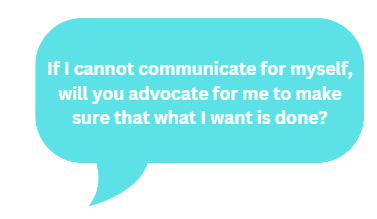Having a Conversation with Your Loved Ones about Health Care Wishes
It’s up to you to take the initiative and express your wishes. Your family or loved ones are not likely to raise the issue for you.
Talk about your “Why”
One way to approach the subject is to talk about why you have decided to talk about these issues.
Did a particular event cause you to make the decision? Did an article in the newspaper or something that happened to a family member make you think about it? What is motivating you to take these actions now?
Share what makes your life worth living
Sometimes sharing your personal concerns and values, spiritual beliefs, or views about what makes life worth living can be helpful.
What aspects of your life give it the most meaning? How do your religious or spiritual beliefs affect your attitudes toward dying and death?
Discuss medical decisions with loved ones
Sharing your medical care decisions with your loved ones will help them ensure your wishes are followed.
How important is it to you to be physically independent and stay in your own home? Would you want to take into account the effect your illness would have on any other people?
Reassess your decisions over time. These are not simple questions and your views may change. It is important that you review these issues and discuss your choices as your personal health or circumstances change your life.
Should close family members express strong disagreement with your wishes, your healthcare agent and medical team may find it extremely difficult to carry out the decisions you would want.
What To Do if Family Members Disagree
If you foresee that your health care agent may encounter resistance from your family members, the following steps can help:
Communicate with family members you anticipate may object to your decisions.
Tell them in writing whom you have appointed to be your health care agent and explain why you have done so.
Let them know that you do not wish them to be involved with decisions about your medical care and give a copy of these communications to your health care agent as well.
Give your primary physician copies of written communications you have made.
Prepare a more specific, written living will.
Make it clear in your documents that you want your agent to resolve any uncertainties that could arise when interpreting your living will. A way to say this is: “My agent should make any decisions about how to interpret or when to apply my living will.”
An important part of communicating your health care wishes is discussing with your loved ones what you may need from them if you are faced with a life-threatening illness. Some questions that you may want to ask are:
The Conversation Project provides additional information about having the conversation with your loved ones about Advance Care Planning. To learn more, visit their website here.








